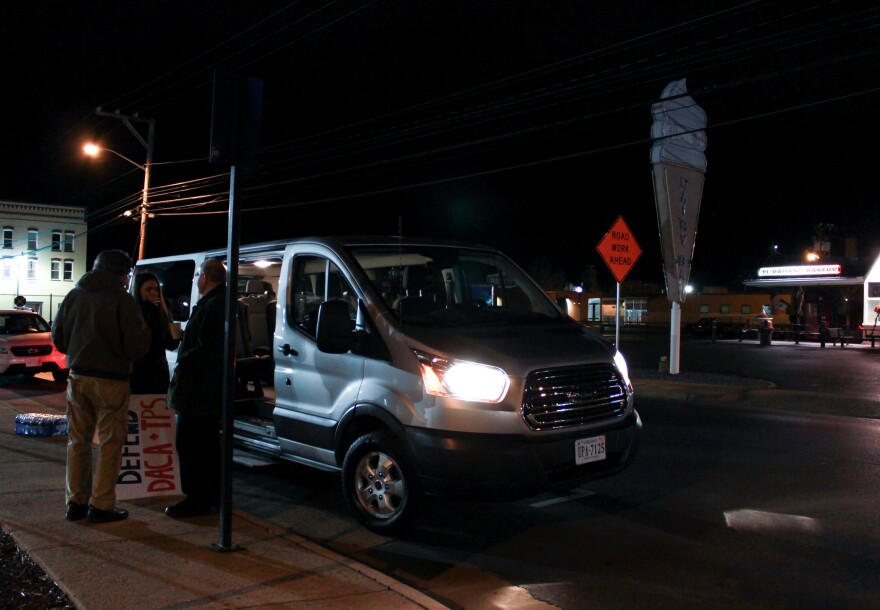The fate of nearly a quarter-million people living in the U-S under “Temporary Protected Status,” or TPS, will soon be decided in the U.S. Court of Appeals for the Ninth Circuit. The case is known as Ramos v. Nielsen. Yesterday / On Tuesday, two vans full of local residents who are here under TPS, and their allies, traveled from Harrisonburg to join a TPS Alliance rally in Washington, D.C. WMRA’s Randi B. Hagi reports.

[Sound of ralliers packing up the van, with the Rivas kids practicing their chants]
If the U.S. Court of Appeals decides in favor of the government’s appeal, it will end the TPS program for beneficiaries from Sudan, Nicaragua, Haiti, and the largest group, El Salvador, giving them about six months to return to their countries of origin. Almost 200,000 Salvadorans live in the U.S. under TPS; approximately 2,000 of them are in the Shenandoah Valley.
Many recipients from El Salvador have children who were born here. That includes Harrisonburg 8th-grader Emely Rivas, who attends Skyline Middle School and enjoys walking her dog, Molly.
EMELY RIVAS: We’re going to go rally in support for our parents, we’re gonna cheer.
Emely and her older sister, 16-year-old Emma, attended Tuesday’s rally at the Supreme Court building in D.C. They’ve been training with the National TPS Alliance to defend their parents’ right to live in the U.S.
EMMA RIVAS: I think that some people just think that … they should go back home, you know, they should go back to where they came from. I know that I’ve heard that. And I think that they need to realize that these people have been here for almost 20 years … this is their new home. This is where they’re supposed to be. This is where they’ve created businesses, families, friends, you know, this is their life now.
Their mother, Roxana Rivas, explained that TPS was first instituted for El Salvador in 2001, after an earthquake killed over a thousand people. Her daughter Emma translates.
ROXANA RIVAS: La razón, pues, empezó con la … terremoto …
EMMA: So it all started with the earthquake, that we had in El Salvador, which was very traumatizing for a lot of people and it damaged a lot of people’s homes … she had to come because she had two kids over there, and there was no way to provide for them … after the earthquake, a lot of it was just torn down.

Roxana and her husband, whose life had been threatened by gang members in El Salvador, came to Harrisonburg, where they stayed with a friend while they got on their feet. They both work in construction. The Rivas have now had to discuss what might happen to their children if they are forced to leave the U.S. Emma said she’s fighting to preserve TPS with the hope that her parents will never face that decision.
EMMA: And it definitely wasn’t an easy conversation to tell your kids, oh yeah, this is the backup plan, in case they decide to take me and your Dad away … they don’t want us to go back to El Salvador with them.
In the years following the earthquake, TPS has been extended for Salvadorans due to hurricanes, widespread violence, and high unemployment. TPS beneficiaries have to re-apply for the program periodically. Developing a criminal record, such as two misdemeanors, while living in the U.S. disqualifies one for re-applying.
EMMA: They pay taxes. They do everything a U.S. citizen does, without complaint … our lives aren’t temporary.
As Emma translates, their parents didn’t expect them to become activists.
ROXANA: Nunca pensé que mis hijas iban hacer un apoyo …
EMMA: I never thought that my daughters would be supporting me for TPS and doing this much for me and the community, and I’m very proud of them, and I will keep supporting them for as long as I can.
The Rivas children have lived their whole lives in Harrisonburg. They feel safe here. Emely, although years away from the decision, thinks she might like to attend JMU. Emma works a part-time job at Walmart and is focused on maintaining a high GPA at Harrisonburg High School.
EMMA: They don’t have the right to take away my parents. They don’t have the right to take away the people I need most. Like I said, I’m in my junior year, you know, and instead of stressing about my SATs, what college I’m going to go to, I’m stressing about whether or not my parents are going to be here to see me walk off that stage … All the sacrifices that they’ve done, I want them to see that it’s paid off, you know, I want them to see me with my diploma in my hand. I want them to see me with the future career that I’ve got planned. And it’s not fair to us, to have to do this, you know, have to stress about this every single night that we go to sleep, to picture, oh, is my Mom going to be there tomorrow? Are my parents going to be here tomorrow?
The Rivas family is now waiting for a decision on Ramos v. Nielsen that could come any day now.


